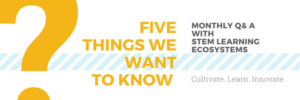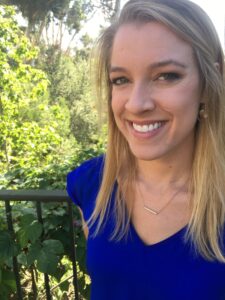AmeriCorps VISTA members provide vital support to several STEM Learning Ecosystems. This month’s column is focused on the work of Emily Hollas, the VISTA working with the San Diego EcosySTEM.
- What is your job and how did you get started doing it? I pursued a position with AmeriCorps following graduate school. Fresh out of school, and having minimal work experience, AmeriCorps seemed like the ideal path to take to gain valuable skills and experience while aligning with my passion to work in the nonprofit sector. As an AmeriCorps VISTA, I assist the San Diego STEM Ecosystem, with a particular focus on building the infrastructure of the working groups that comprise this Ecosystem.
- How do VISTAs support SLEs and other STEM education? The VISTAS and I have supported SLEs by integrating the skills and knowledge we have into our projects and assignments. For instance, my focus on program evaluation during graduate school has been useful as our Ecosystem is making steps towards building an asset map and conducting a gap analysis of STEM programs in the County.
- What is most challenging about your job? The most challenging, but extremely rewarding, aspects are the tasks I am given that I have little experience with, specifically, networking and grant writing. The minimal exposure I had to grant writing and networking was through coursework and internships but both have been integral during my service. Not only are the skills I’ve gained by hands-on learning have been invaluable to me, the resulting impacts for the Ecosystem are significant.
- How can your peers support and challenge you? I have had a lot of support from my fellow VISTAs by receiving and giving feedback on our experiences in the Ecosystems we are working with. Hearing other approaches challenges us to try new methods and solutions with obstacles we are facing within our Ecosystems because it has worked for others. It is great to have that kind of support and sharing a sense of camaraderie even with VISTAs who are in different states than me. (Sounds a lot like the way Ecosystems work overall…)
- Do you have any mentors? My professor/mentor in grad school, Dr. Delgado, has been one of my biggest inspirations in so many ways. She challenged me to think critically throughout my graduate career. I learned I should always explore new and/or alternative solutions and possibilities – and that just because one answer is presented to me does not always mean it is the best one. There is always room to research new possibilities. Also, my dad, having worked over 20 years as a professor and associate dean, has been the biggest source of guidance throughout my life in my personal, academic, and professional matters. He inspires me and teaches me through his actions and personal experiences how to handle personal and professional situations with honesty, integrity, and respect for others.
Learn more about the results of Emily’s work in her newsletter article about Working Groups in the San Diego STEM Ecosystem.
We appreciate Emily sharing her experience as a VISTA. It’s clear that there are significant impacts on participants like Emily, their sponsoring organizations, nationwide STEM education, and as a result, the preparedness of the workforce.
The Corporation for National and Community Service, the agency that houses AmeriCorps VISTA, is one of the programs slated for elimination in the President’s FY18 budget proposal. If CNCS were to be eliminated, the AmeriCorps VISTA program would cease to exist. Consider the impact of Emily and her colleagues in the VISTA program, and urge your members of Congress to continue funding CNCS.


